学位英语常考语法
- 格式:pdf
- 大小:272.93 KB
- 文档页数:23
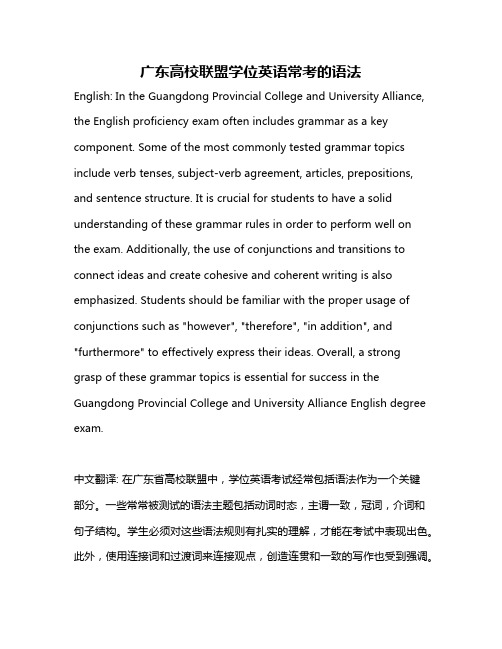
广东高校联盟学位英语常考的语法English: In the Guangdong Provincial College and University Alliance, the English proficiency exam often includes grammar as a key component. Some of the most commonly tested grammar topics include verb tenses, subject-verb agreement, articles, prepositions, and sentence structure. It is crucial for students to have a solid understanding of these grammar rules in order to perform well onthe exam. Additionally, the use of conjunctions and transitions to connect ideas and create cohesive and coherent writing is also emphasized. Students should be familiar with the proper usage of conjunctions such as "however", "therefore", "in addition", and "furthermore" to effectively express their ideas. Overall, a strong grasp of these grammar topics is essential for success in the Guangdong Provincial College and University Alliance English degree exam.中文翻译: 在广东省高校联盟中,学位英语考试经常包括语法作为一个关键部分。
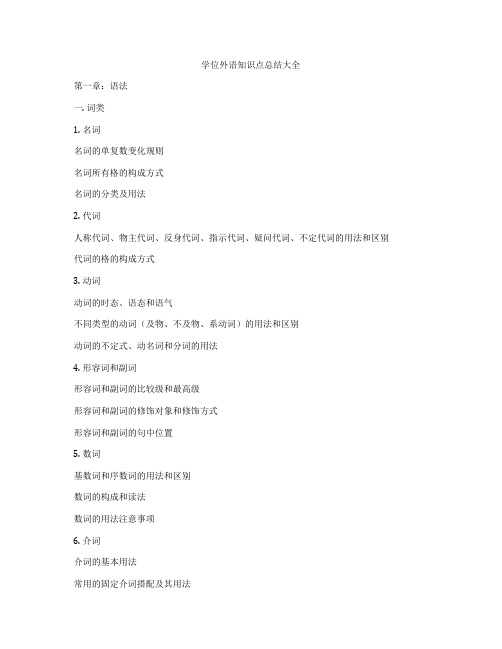
学位外语知识点总结大全第一章:语法一. 词类1. 名词名词的单复数变化规则名词所有格的构成方式名词的分类及用法2. 代词人称代词、物主代词、反身代词、指示代词、疑问代词、不定代词的用法和区别代词的格的构成方式3. 动词动词的时态、语态和语气不同类型的动词(及物、不及物、系动词)的用法和区别动词的不定式、动名词和分词的用法4. 形容词和副词形容词和副词的比较级和最高级形容词和副词的修饰对象和修饰方式形容词和副词的句中位置5. 数词基数词和序数词的用法和区别数词的构成和读法数词的用法注意事项6. 介词介词的基本用法常用的固定介词搭配及其用法并列连词和从属连词的用法和区别连接词语的连词和分句的连词的用法8. 冠词定冠词和不定冠词的用法和区别冠词的特殊用法9. 句子成分主语、谓语、宾语、定语、状语、补语在句子中的位置和构成方式句子成分的语序和搭配规则二. 句型1. 简单句构成简单句的基本成分简单句的主谓一致和时态一致问题2. 复合句常见的复合句结构和连接词不同类型的从句构成方式和用法3. 并列句并列句的构成方式和连接词并列句的并列成分及其使用方式4. 祈使句祈使句的构成和用法祈使句的否定和虚拟形式5. 疑问句基本疑问句和特殊疑问句的构成方式和用法疑问句的反意疑问句的构成方式和使用规则感叹句的构成和用法感叹句的语气和修饰成分三. 语法习惯1. 主谓一致主语和谓语在人称和数上的一致问题主语和谓语在时态和语态上的一致问题2. 时态和语态不同类型的动词在句子中的时态和语态使用规则时态和语态在句子中的逻辑关系和修饰方式3. 语气和语调句子中不同类型的语气和语调的使用规则句子中语气和语调的表达方式和表达目的第二章:词汇一. 词汇量1. 日常词汇生活中常用的词汇及其用法和搭配与人、事、物相关的词汇2. 专业词汇与专业相关的词汇及其用法和搭配行业术语和专业名词的词汇量和掌握方式3. 情景词汇不同场景中常用的词汇及其使用规则不同情景下词汇的推测和表达方式二. 词汇构词英语中常见的词根及其构词方式词根与词缀的搭配规则和构词技巧2. 词缀前缀、后缀和词根在构词中的作用和运用不同类型的词缀在构词中的使用规则和搭配方式3. 合成词合成词的构成方式和词义变化规则常见的合成词及其用法示例三. 词语搭配1. 搭配规则常用词语的搭配规则和语义搭配技巧相关词语的搭配方式和使用方法2. 固定搭配词语固定搭配及其用法规则固定搭配在句子中的运用技巧和意义表达3. 习惯搭配口语和书面语中常见的习惯搭配习惯搭配在交际中的使用方式和交流技巧四. 词语用法1. 词义辨析近义词和异义词的区别和用法辨析词义的转义和比喻表达2. 词语用法常见词语的多种用法和搭配方式不同词性词语的灵活用法和语境解释3. 词语考察常见词语的考察形式和解题技巧词汇题在考试中的注意事项和解答策略第三章:阅读一. 阅读理解1. 阅读技巧快速阅读和精读技巧阅读中引导注意力的方法和技巧2. 阅读题型不同类型的阅读题目及其解题思路阅读中的细节题和主旨题的解答技巧3. 阅读素材多种文体和话题的阅读素材不同题材下的词汇、语法和句型特点二. 阅读理解能力1. 词汇理解阅读理解中的生词词汇处理技巧词义推测和词义辨析的解题技巧2. 文章结构不同文章结构和段落结构的特点文章中逻辑关系的表达方式和解析方法3. 阅读推理根据文章推理出隐含信息的技巧分析作者观点和态度的解读方法三. 阅读素材分析1. 文学类文本文学作品的语言特点和表达方式文学作品中的情感、形象和主题2. 新闻类文本新闻报道的语言风格和写作手法新闻中的信息呈现方式和新闻价值追求3. 学术类文本学术论文的语言风格和表达方式学术文章中的逻辑结构和论证方法第四章:听力一. 听力技巧1. 听力训练不同类型的听力训练方法和技巧提高听力的实用方法和技术2. 听力题型不同题型的听力题目及其解题思路听力中的细节理解和主旨把握技巧3. 听力素材多种语境和场景的听力素材不同听力素材下的词汇、语法和句型特点二. 听力理解能力1. 基本信息听力中对基本信息的捕捉和理解听力中不同信息表达方式和解读技巧2. 细节信息听力中对细节信息的辨别和把握听力中细节信息的思维输入和思维输出3. 推理信息通过听力推理出隐含信息的技巧分析说话者观点和态度的解读方法三. 听力素材分析1. 对话对话中的日常交流和情景表达对话中的语速、语调和表达方式2. 新闻报道新闻报道的语言风格和信息传递新闻报道中的事件描述和态度呈现3. 学术演讲学术演讲的语言规范和论述结构学术演讲中的逻辑思维和研究观点第五章:口语一. 口语表达1. 口语技能流利口语的基本技巧和训练方法口语表达的准确和实时性管理2. 口语话题日常生活中常见的口语话题不同情景下的口语交际技巧和策略3. 口语素材多种话题和场景的口语表达素材不同口语素材下的词汇、语法和句型特点二. 口语能力1. 对话交际日常对话交际的基本规范和技巧双向交流的逻辑思维和互动表达2. 讲演表达讲演表达的语言规范和主题概括讲演表达的控场和情感表达3. 辩论演讲辩论演讲的辩证思维和逻辑讲述辩论演讲的策略和观点阐释三. 口语素材分析1. 交际对话日常交际对话的场景和语境交际对话中的表达方式和语气处理2. 讲故事讲故事的情节设计和表达技巧讲故事的语气和节奏控制3. 个人陈述个人陈述的主题和内容选择个人陈述的表达方式和情感表达第六章:写作一. 写作技巧1. 写作结构不同类型文章的写作结构和框架文章的段落结构和逻辑发展2. 写作技法写作中的丰富文辞和表达方法写作中的修辞手法和逻辑推理3. 写作素材多种写作素材的应用和展示不同写作素材下的词汇、语法和句型特点二. 写作能力1. 语言表达写作中的信息传递和情感表达写作中的语言规范和修辞技巧2. 逻辑思维写作中的逻辑结构和文章主题文章的论证方法和观点表达3. 文体转换不同文体下的写作特点和表达方式文体转换中的语气和语调处理三. 写作素材分析1. 议论文议论文的论证方式和观点表达议论文的立意、中心和结尾2. 散文和随笔散文和随笔的情感表达和人文关怀散文和随笔的语言特点和篇章安排3. 实用文实用文的信息呈现和逻辑结构实用文的书面语规范和文字风格。

1.After 15 years in the United States, he has finally decided to apply for American citizenship.2.Americans eat twice as many vegetables per person today as they did in 1910.3.All I'm trying to do is to find out why your condition has not been improved.4.At no time and under no circumstances will I stop the experiment.5.As Christmas was coming, the town began a thorough clearing on a large scale.6.After the war, a new school building was put up where there had once been a theatre.7.A modern city has been set up in what was a wasteland ten years ago.8.Alice trusts you. Only you can persuade her to give up the foolish idea.9.A man is being questioned in relation to the attempted murder.10.After the new technique was introduced, the factory produced twice as many cars in 2002 as the year before.11.After the fire, what would otherwise be a cultural center is now reduced to a pile of ashes.12. A library with five thousand books is offered to the nation as a gift.1. By no means will Jane agree to move to a new place far away from her workplace, because it isn't convenient for her family and herself.2. By the end of this month, we surely will have found a satisfactory solution to the problem.3. Because of many mistakes, she was made to type these letters again.1. Since customers work during the day, Billy has to collect the money from them at night.2. Could I borrow that book when you've finished reading it?3. Charles Babbage is generally considered to have invented the first computers.1. Don't worry if you can't understand everything. The teacher will review the main points at the end.2. Do you think that the labor bill will be passed?" "Oh, yes. It's very likely that it will.3. Dialogue is a total loss unless the reader knows who is speaking.4. Do you mind if I call you Ben? ---- Not at all.5. Don’t leave matches or cigarettes on the table within the reach of little children.6. Did you notice the little boy take the candy and run away?7. Don’t worry me now, I will mend that coat by and by.1. E-mail writing has became the usual means of communication with people some distance away.1. Given the choice between work and play, Tom would surely prefer the latter.2. Get up earlier so that you can catch the train tomorrow morning.1. He began to work for a big company at an early age.2. Health problems are closely connected with bad eating habits and a lack of exercise.3. He must have completed his work; otherwise, he wouldn't be enjoying himself by the seaside.4. He would have passed the math’s examination if he had worked hard enough, but he didn't.5. Having taken our seats, we were attracted by the lecturer immediately.6. Her heart beat faster when she entered the exam hall.7. How many more decades will have to pass before scientists succeed in providing a cure for cancer?8.How close parents are to their children has a strong influence on the development of the children's character.9. He changed his name, thinking that nobody would find out what he had done before.10. He is given answers that only add to his confusion.11. He smiled and told me I would receive a(n) extra $100 a year!12. His plan was laughed at by those who heard it.13. So long as he works hard, I didn't mind when he finishes the experiment.14. He never troubled to read the news but turned at once to the crossword on the last page.15. He said he was to return from Germany the next day.16. He didn't live up to what had been expected of him.17. He lived to be ninety-eight, the healthiest man in Bulgaria.18. Her father insists that she should stay there until she finishes her scientific research.19. He began by showing us where the country was and went on to tell us about its climate.20. How did you pay the workers? –As a rule , they were paid by the hour.21. His wife had the front door painted green yesterday, didn’t she?22. Her brother threatened to leave her in the dark room alone when she disobeyed his order.23. He is a man who is always seeking fault with other people.24. Hearing the gunshot, all the birds flew in every direction.25. His parents cut off his money, so he is in trouble now.1. I was so fired then that I fell asleep in class.2. I can only stay here for a while, but I'll come again in a few days.3. In our daily life, everyone fails every now and then. It is how you react that makes a difference.4. It is reported that the police will soon look into the case of the two missing children.5. If it rains tomorrow, we will stay indoors to have our training class.6. It was in 2005 that we began to introduce this new technique into our company.7. In recent years many football clubs have been run as business to make a profit.8. It is well known that teaching is a job calling for enough patience.9. I didn't expect to receive a postcard from you! It's really beyond my wildest imagination.10. It doesn't make sense to buy that expensive coat when these cheaper ones are just as good.11. I am afraid that his phone number has slipped my mind for the moment.12.It was the wealth of the prosperous pioneer landowner John Harvard that made Harvard University possible.13. I am not sure whether we can give the right advice in case of emergency.14. I know Jonathan quite well and never doubt that he can do a good job of it.15. It was not very wise of you to sell the house. The price is increasing everyday.16. It was difficult to guess what her reaction to the news would be.17. I didn't know what to do, but then an idea suddenly occurred to me.18. Inquiries concerning the condition of the patients may be made personally or by telephone.19. It's a pity that you missed such an interesting program.20. If you don't go to school regularly, you will not learn your lessons very well.21. I believe you and Sally will really impress the teacher." "Well, don't expect too much of us.22. I know that either you or your father has a copy.23. I know nothing about it except what I have read in the papers.24. If the train arrives on time it should be three o'clock exactly.25. I can hardly believe my eyes. This unremarkable man is actually a scientist who once won the Nobel Prize26. I ran into Alice, who was on her way to see how I was getting along.27. I know nothing about it except what I have read in the papers.28. I tried very hard to persuade him to join our group but I met with a flat refusal.29. It was difficult to guess what her reaction to the news would be.30. I will repair this new TV set without charging because it is under guarantee.31. I'll call to see you this evening though I can stay only a few minutes.32. It was a long drive to get to the beach and we three took the wheel in turn.33. "I'm leaving now." "Make sure you have locked the door."34. I felt that I was not yet strong enough to travel.35. It seems very difficult to keep the child from crying.36. Is there anything the matter with him?37. It was only when I reread these poems recently that I began to appreciate their beauty.38. I think you had better try again.39. I’d like to hear some more ideas. What do you think of this matter, Mr. Turner?40. I wrote down his phone number in case I should forget it.41. I meant to ring you , but I’m afraid I forgot.42. Is there any possibility of getting the price reduced further?43. It is hot and dry; the flowers need to be watered.44. In no case should we prevent the students from exploring new ideas.45. I don’t think it advisable that Tom be assigned to the job since he has no experience.46. It is a good idea for parents to monitor the amount as well as the kind of television that their children watch.47. I’m afraid that there isn’t room for you in my car.48. It suddenly occurred to me that we could use a computer to do the job.49. I’m putting on weight. The doctor has warned me to keep off sugar.50. If you go to the movie tonight, so will I .51. As is well-known, the environment in China is badly in need of improvement.52. I walked out of the cinema, determined to return to see the wonderful film the next Sunday.53. It turned out that the man was an excellent policeman working in New York, who had contributed a lot to the case.54. It shames me to say it, but I told a life when questioned at the meeting by may boss.55. It is certain that he will hand over his business to his son when he gets old.56. “I usually sleep with the windows closed at night, even in summer.”“You can never be too careful.”57. “What is your nationality, Miss Green?”“Australian.”58. I hope the stove will give off enough heat to warm the room.59. while I accept that the plan is not perfect, I do actually like it.60. I don’t think Mary understood what you said, did she?61. I am sure David will be able to find the library because he has a pretty good sense of direction.62. If anyone happens to drop in while I am out, have him or her leave a message.63. I suggested the boy to save money, but he wouldn’t listen.64. I made a call to my parents yesterday. To my disappointment, neither of them answered it.65. As is often the case, we have worked out the production plan.66. It is no use talking to him, because he will never change his mind.67. In another year or so, you will have forgotten all about it.1. James doesn't like pop music, Neither does his sister.1. My uncle's house in the downtown area is much smaller than ours, but it is twice as expensive.2. Many children, whose pare nts are away working in big cities, are taken good care of in the village.3. Mr. Wang is an engineer by profession.4. My father never gave me much advice.5. Many words in the English language are French in origin.6. Mr. John kept thinking hard, but failed to come up with a workable plan.7. Since many of the customers work during the day, Billy has to collect the money from them at night.8. Mary was going to a wedding so she brushed her hair well.9. Mary wishes that she had studied economics instead of literature when she was at college.10. My aunt was seen filled with great anger. D.11. My father has classes every other day: Mondays, Wednesdays and Fridays.12. My suggestion yesterday was that a meeting be held to discuss the matter.13. Modern plastics can stand very high and very low temperatures.14. Mrs. White became a teacher in 1985. She will have been teaching for twenty years by next summer.1. None of them spoke English except Sam.2. Not until your work is finished can you leave.4. Nobody knows how long and how seriously the shakiness in the financial system will drag down the economy.5. No matter what you say, I don’t think he would be so selfish as to refuse to help us.6. No matter whether he is able to come to the party or not, we will invite him.1. One of the best ways for people to keep fit is to develop healthy eating habits.2. Over the past decades, sea ice has been decreasing in the Arctic as a result of global warming.3. Our failure to adapt ourselves to modern life often causes us trouble in our work.4. Once convinced of the necessity of a move, he worked hard to find a new home.1. Please don't leave the building unless asked to do so.2. Professor Smith, along with his assistants, is working on the project day and night to meet the deadline.3. People may have different opinions about Karen, but I admire her. After all, she is a great musician.1. Since it is already midnight, we had better leave now.2. Surely it doesn't matter where the clubs get their money; what counts is what they do with it.3. Some of the meat came from Canada. How about others?4. Send us a message if you have any difficulty.5. Since we can't hear you at the back of the hall, you'll have to raise your voice.6. She did not feel like going out, as she had a slight headache.7. Some of your suggestions have been adopted but others have been turned down as they are not workable.8. Sun glasses are used to protect people's eyes from the light of the sun.9. She died of heart failure with her life’s work remaining unfinished.10. She didn’t feel like working, so I suggested spending the afternoon in the garden.11. She is as poor a speaker as I am.12. So badly was John injured in the car accident that he had to be in hospital for a few weeks.13. She believes that her son is too clever to do something stupid.14. So many representatives being absent , the conference had to be put off.15. She is very likely to ring me tonight. I can sense that.16. Small talk is a good way to kill time, make friends and share something with others.17. Some people like drinking coffee, for it has stimulating effects.18. She says she’d rather he stimulating tomorrow instead of today.1. There are two rooms in the house, the smaller of which serves as a kitchen.2.The driver was at a loss when / word came that he was forbidden to drive for speeding.3. This magazine is very popular with young people, who like its content and style.4. The art show was far from being a failure; it was a great success.5. The hotel was awful! To begin with, our room was far too small. Then we found that the shower.6. The company is starting a new advertising campaign to attract new customers to its stores.7. Bitten twice, the postman refused to deliver our letters unless we chained our dog.8. The college sports meet was put off till next week because of the heavy rain.9. That big dictionary cost Tom two hundred dollars.10. The task is too much for me, so I can't carry on alone any longer. I must get some help.11. The two girls are getting on very well and share much with each other.12. The taxi driver was put in / prison because his car had knocked down a child.His wife went to the prison to see him twice a month.13. The man has a special talent for art and is anything of a musician.14. The engineer is not happy with the project, and neither is her boss.15. There is so much work to be done today Would you be kind enough to lend me a hand?16. The boy came at the dog with a thick stick but the dog did not yield.17. They were so far away that I couldn't make out their faces clearly.18. The race was so close that everyone was holding his breath at the finish.19. This is a convincing argument.20. This is the problem to which you should pay attention.21. The kinder you are, the happier they will be.22. The speech having been delivered, a lively discussion started.23. This is the hotel in which I met the famous actor Chen Long.25. The government will have to work hard to win back the confidence of the people after the terrible event.26. They have never heard any customer's complaint.27. The police did not at first connect her with the crime.28. The United Nations Conference on Global Environment, which took place earlier this year in Vienna, was a very productive meeting.29. The escaped prisoner waited until dead of night before leaving his hiding place.30. Now that my head had cleared, my brain was also beginning to work much better.31. The noise of the traffic distracted Paul from his work.32. The U.S. Federal Reserve Bank is expected to raise interest rates on Tuesday.33. There is no point in going to school if you're not willing to learn.34. The WTO cannot live up to its name if it does not include a country that is home to one fifth of mankind.35. The reporter said that the UFO was traveling east to west when he saw it.36. The laser beam is also different from ordinary light beams in the way in which it travels.37. To become a doctor, you need several years of study.38. The number of nurses at the hospital has increased.39. Tom talks as if he knew everything about it.40. The news quickly spread through the village that the war had ended41. The old people often raise pets for the sake of companionship.42. The river here is very wide but shallow, so you can walk across it.43. The streets were empty except for the policemen on duty.44. This morning Jack came to school late as usual.45. The president spoke at the business meeting for nearly an hour without referring to his notes.46. The Internet has brought about big changes in the way we work.47. whatever the price is, they are prepared to pay.48. The Internet has brought about big changes in the way we work.49. They started off late and got to the airport with minutes to spare.50. The evening news comes on at seven o’clock and lasts only thirty minutes.51. The factory had to lay off a number of employees because of the economic crisis in the country.52. They had a pleasant chat over a cup of coffee.53. The comments which he made concerning marketing bothered his boss greatly.54. The news reporters hurried to the airport, only to be told the film stars had left.55. There were dirty marks on her trousers where she had wiped her hands.56. The factory had to lay off number of employees because of the economic decline in the country.57. There is no doubt that you will pass the exam this time. You have worked so hard in the past months.58. The idea occurred to him in his dream and he decided to carry it out.59. They decided to chase the cow away before it did more damage.60. The way I thought of to protect the animal was of great value.61. The novel I bought last week is worth reading ,I think.62. “That latest car must have cost you a pretty penny.”“Oh, no ,it didn’t.”63. At no time will China be the first to use nuclear weapons.64. The bridge was named after the hero who gave his life for the cause of the people.1. Unless he is confessing intense love, he hardly ever looks into someone else's eyes for very long.1. When Bob and his friends came, we were having our supper then.2. With everything she needed bought, she went out of the shop, with her hands full of shopping bags.3. Without my glasses I can hardly make out what has been written in the letter.4. Would you mind keeping a(n) eye on the house for us while we are away?5. We were held up for half an hour in the traffic and so we arrived late.6. Without even thinking about what he was doing, he stopped the car.7. Weather permitting , we shall begin to work tomorrow.8. We hurried to the station only to find ourselves three hours earlier for the train.9. We live in a time when, more than ever before in history, people are moving about.10. With all this work on hand, she shouldn’t have gone to the dance party last night.12. With oil prices keeping rising, people are hesitating whether to buy a car or not.13. We were very disappointed at the response to our advertisement, and our products didn’t sell well.14. Who would you rather have repair the computer, Mr. Lin or Mr. Chen?15. When climbing the hill, John was knocked unconscious by an unexpected rolling stone.16. When I mention the problem, I’m not referring to all of you.17. We were tired and nervous with the constant tension.18. “Which do you want, the red one or the black one?”“_ Neither_. How about showing me another?”19. “what makes her so unhappy?” “_ Her losing_ one of her favorite books.”20. Wait a moment, please. Richard will be back _ in no time__.21. Was it in 1969 __ that___ the American astronaut succeed __ in___ landing on the moon?22. We wanted a new table for dinner, so my father bought __ one___ from a furniture store yesterday.1. You can, __when__ the sky is clear, see as far as the old temple on top of the mountain, but not today.2. You __ have to____ drive on the right in the U. S. A.3. ___ Need___ you have the radio on so loud, John? I'm studying.4. You'll find this tourist map of great value in helping you to ___ get around___ London.5. ___ Unless__ you feel too ill to go out, I would rather not stay at home tonight.6. You don’t know about the difficulty I had __ in doing____ the work then at all.7. ___ That__ you don’t know the rule won’t be a sufficient excuse for your failure.8. _____ you’re early you can’t be sure of getting a seat. B. Unless9. Your idea seems to be good but it isn’t __ practical___.10. You look tired. Do you ___ feel like having___ a rest?11. You __ could___ not have seen her yesterday, for she was abroad.12. You may depend on __ it that__ will not repeat his mistakes.。
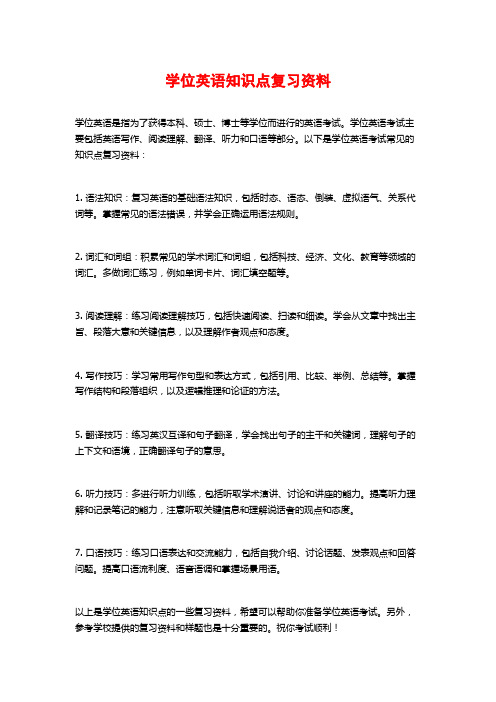
学位英语知识点复习资料
学位英语是指为了获得本科、硕士、博士等学位而进行的英语考试。
学位英语考试主要包括英语写作、阅读理解、翻译、听力和口语等部分。
以下是学位英语考试常见的知识点复习资料:
1. 语法知识:复习英语的基础语法知识,包括时态、语态、倒装、虚拟语气、关系代词等。
掌握常见的语法错误,并学会正确运用语法规则。
2. 词汇和词组:积累常见的学术词汇和词组,包括科技、经济、文化、教育等领域的词汇。
多做词汇练习,例如单词卡片、词汇填空题等。
3. 阅读理解:练习阅读理解技巧,包括快速阅读、扫读和细读。
学会从文章中找出主旨、段落大意和关键信息,以及理解作者观点和态度。
4. 写作技巧:学习常用写作句型和表达方式,包括引用、比较、举例、总结等。
掌握写作结构和段落组织,以及逻辑推理和论证的方法。
5. 翻译技巧:练习英汉互译和句子翻译,学会找出句子的主干和关键词,理解句子的上下文和语境,正确翻译句子的意思。
6. 听力技巧:多进行听力训练,包括听取学术演讲、讨论和讲座的能力。
提高听力理解和记录笔记的能力,注意听取关键信息和理解说话者的观点和态度。
7. 口语技巧:练习口语表达和交流能力,包括自我介绍、讨论话题、发表观点和回答问题。
提高口语流利度、语音语调和掌握场景用语。
以上是学位英语知识点的一些复习资料,希望可以帮助你准备学位英语考试。
另外,参考学校提供的复习资料和样题也是十分重要的。
祝你考试顺利!。

函授本科学士学位英语考试语法
以下是函授本科学士学位英语考试语法:
1. 时态和语态:掌握基本时态(如一般现在时、一般过去时、一般将来时、现在完成时、过去完成时等)的用法,以及主动语态和被动语态的使用。
2. 非谓语动词:掌握不定式、动名词和分词的基本用法,理解它们的时态、语态和非谓语形式。
3. 虚拟语气:掌握虚拟语气的基本用法,包括条件句中的虚拟语气、建议、要求和愿望等表达方式。
4. 定语从句和状语从句:掌握定语从句和状语从句的基本用法,包括关系代词和关系副词的用法,以及从句的时态和语态。
5. 主谓一致:掌握主谓一致的基本原则,能够正确判断主语和谓语之间的关系,避免出现主谓不一致的错误。
6. 强调句和倒装句:掌握强调句和倒装句的基本结构和用法,理解它们在语境中的意义和作用。
7. 常用词组和短语:掌握常用词组和短语的用法,能够正确理解其在句子中的意义。
8. 词汇选择:根据语境选择合适的词汇,避免使用过于简单或过于复杂的词汇。
9. 句子结构分析:能够正确分析句子结构,理解句子中各个成分之间的关系。
10. 阅读理解:掌握阅读理解的基本技巧和方法,能够快速准确地理解文章
的主旨和细节。
11. 写作:掌握基本的写作技巧和方法,能够清晰地表达自己的观点和思想。
以上是函授本科学士学位英语考试语法的主要内容,当然在实际考试中可能还有其他的要求和内容。
建议考生仔细阅读考试大纲,了解考试的具体要求和考试形式,以便更好地备考。

学士学位英语语法汇总一、非谓语动词—固定句型搭配1.动名词1.remember doing 记得做过某事2.remember to do 记得去做某事(事情还没有没有做)3.forget doing sth 忘记做过某事4.forget to do sth 忘记去做某事2.不定式find sb to do sth 找某人做某事see的宾语补足语是不带to的不定式,变为被动语态时,该不定式前要加towh-+to do(sth)在句中作主、宾、表、状语It will take sb(time)to do sth 做某事要花某人时间3.现在分词在with引导的独立主格结构中,主谓关系用现在分词介词后面要跟动名词做宾语,当动名词的动作发在谓语动词所表示动作之前时,要用动名词的完成时二、虚拟语气1.一般过去时表示对现在的假设(与现在事实相反)2.在It is/was+形容词+that从句中+should(可省略)+动词原形3.without引导虚拟语气,与现在事实相反,主句用一般现在时,would+动词原形4.混合虚拟语气,but后面表达的是真实情况5.It is(high)time+ that(该是……时候了)+一般过去时表示虚拟语气6.if从句中含有were,should,had时,将if省略把were,should或had移到句首7.表示与过去事实相反的虚拟句,用过去完成时,条件从句省略if,句子要倒装8.But for(要不是)虚拟语气,表示与过去事实相反用should/would/ have done sth9.表“建议、命令、要求、渴望”的动词所引导的宾语从句中,从句要用虚拟语气should+动词原形,且should可以省略10.Urgent 后的句子使用虚拟语气should+动词原形11.would rather(宁愿,真希望,宁可)+that从句,从句多用过去式表示虚拟语气12.in case引导的从句要用虚拟语气,结构是should(可省略)+动词原形13.wish(表示愿望)虚拟语气,与过去事实相反的愿望,用过去完成时14.insist+should+动词原形,表示虚拟语气三、强调与倒装1.强调it is+强调部分+that句型consider+it+adj.+that…结构中,it做形式主语认为……都it is/was +强调部分+that(who,whom)+…2.倒装(1)scarcely…when…几乎不(2)no sooner(一旦…立即)…than(3)neither,nor谓语句首时,部分倒装,把助动词放在情态动词前面(4)only+状语+主语半倒装(noly引导状语从句+从句语序不变,主语要倒装)(5)not until 在句首,句子要倒装(6)否定词hardly、scarcely、never、not、little等在句首,句子要倒装(7)So that句型中,so谓语句首时,句子需要倒装四、反义疑问句1.当陈述部分有“have to+v”动词时,提问部分应用助动词doesn‘t/did +主语’2.祈使句,以Don't 开头的反义疑问句,一般用will you3.表示否定意义的词never、seldom、hardly等,疑问部分则用肯定式五、主谓一致1.together with连同;加之(就远原则,谓语动词用单数)2.either A or B(要么…要么…),遵循就近原则六、情态动词1.must have done sth 对已经发生事情的肯定推测2.can't have done表示过去不可能做了什么3.could have done 本可以做某事(本来可以做而实际上没做某事)4.should have done 本应该做某事(本应该做而实际上没有做某事)5.should(not)have done 过去本(不)应该做某事6.may hanve done,也许(表示不确定的推测)7.ought to have done 表示本应该做而没有做七、定语从句(形容词性从句)as 引导定语从句时,可将形容词提前,句子用倒装,Busy as he wasthe same.that和……一样,(表同一个)the same..as和…一样,(表同一类)so…as像……那样的,(so修饰形客词)such…as像……那样的,(such修饰名词)定语从句,先行词是事物或动物时,应该用关系代词which 八、语态与时态以“by+将来时间”引导的表示将来的时间,后面用将来完成时As soon as 引导的从句通常用一般现在时表将来九、固定搭配As is known to all 众所周知had better (had best) do sth 最好做某事had better(had best)not do sth 最好不要做某事belong to 属于no part of the line 没有线的一部分regret(not)doing stn 后悔做某事need/want/request+doing/to be done需要做……it is +形容词+不定式for(sb.’s)not doing sth 为没有做……而道歉enjoy doing sth 喜欢做某事,享受做什么事judging by(from)根据……来判断。

成⼈本科学⼠学位英语语法集锦成⼈本科学⼠学位英语词汇及常⽤语法集锦词汇和语法结构题型中常考词汇:1 虚拟语⽓宾语从句:order,demand,require,request,direct,command,urge,rule,suggest,advise,vote,propose move,recommend,prefer,decide,insist,desire,decree主语从句:vital,important,essential,imperative,obligatory,necessary,unnecessary,impossible,sad,strange,natural,advisable,fitting,proper,appropriate,desirable2 不定式1) 通常只接动词不定式作宾语的常考动词:agree,attempt,claim,decide demand,ask,hesitate,beg,fail,care,consent,promise,desire,hope,intend,learn,offer,plan,refuse,prepare,pretend,strive,require,appear,arrange,expect,manage,tend,afford,wish,want,seem,struggle,swear,threaten,wait,undertake,venture,seek ,resolve,aim,determine,endeavor,apply,claim,pledge,pretend,profess,refuse,volunteer,vow,happen,guarantee,neglect,proceed,prove,condescend,consent,trouble,bother(negative),care(negative),choose,fail etc2) ⽤于动词+宾语+不定式结构的常考动词:force,hire,tell,require,teach,warn,allow,ask,inform,beg,convince,expect,invite,order,permit,promise,instruct,prepare,urge,remind,want,advise,persuade,dare,forbid,like,challenge,request,get,need ,oblige,encourage,enable,compel,recommend,declare,prove,command,encourage,enable,lead,press,etc1) ⽤于be+形容词+不定式结构的常考形容词anxious,boring,dangerous,pleased,hard,eager,easy,fortunate,strange,good,ready,usual,prepared,surprised,common,useless,asked,lucky,difficult,likelysatisfied,careful,sure,glad,bored,certain,etc2) ⽤于名词+不定式结构的常考名词:failure,offer,plan,ability,decision,desire,chance,permission,occasion,fun,honor,capacity,wish,pleasure,opportunity,demand,way,refusal,responsibility,freedom,promise,etc.3) 后⾯跟省去“to”的不定式作宾补的常考动词:see watch,notice,observe,hear,listen to,feel ,get,make,have,let ,help,bid,know,look at ,smell,etc 2009年成⼈英语三级名词常考考点归纳⼀、区分可数名词和不可数名词例1:___great progress he has made!A.HowB.How aC.WhatD.What a此题应选C。
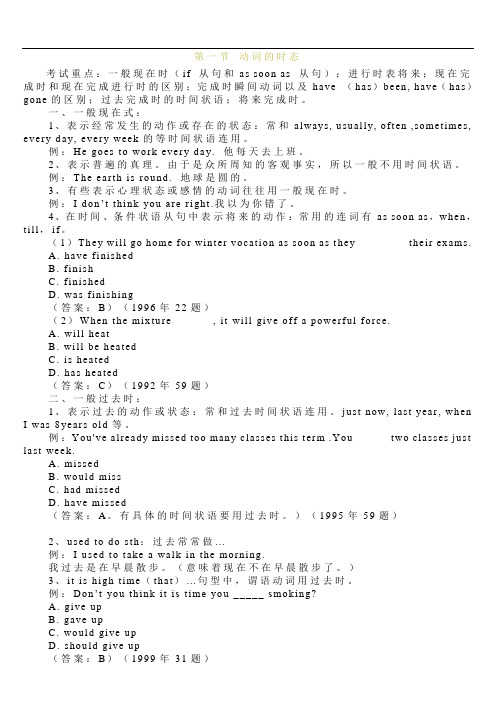
第一节动词的时态考试重点:一般现在时(i f 从句和a s s oo n as从句);进行时表将来;现在完成时和现在完成进行时的区别;完成时瞬间动词以及ha v e (ha s)b e en, ha v e(ha s)go n e的区别;过去完成时的时间状语;将来完成时。
一、一般现在式:1、表示经常发生的动作或存在的状态:常和a l w ays, u s u al l y, o ft e n ,s o m et i m e s,e v e r y d a y,e v e r y w e e k的等时间状语连用。
例:H e go es t o wo r k ev e r y d a y.他每天去上班。
2、表示普遍的真理。
由于是众所周知的客观事实,所以一般不用时间状语。
例:Th e e a rt h i s ro un d. 地球是圆的。
3、有些表示心理状态或感情的动词往往用一般现在时。
例:I d o n’t t hi nk yo u a r e ri ght.我以为你错了。
4、在时间、条件状语从句中表示将来的动作:常用的连词有a s s oon as,w h en,t i l l,i f。
(1)Th e y w i l l go h om e f or w i nt er vo c at i on as s o on as t h e y ________t h ei r ex am s.A. h a v e fi ni s he dB. fi ni shC. fi ni sh edD. w a s fi ni shi n g(答案:B)(1996年22题)(2)W h en t he m i x t u r e ______, i t wi l l gi v e o f f a p ow e r f ul f o r ce.A. w i l l h e atB. wi l l b e h ea t e dC. i s h e at edD. h a s he a t ed(答案:C)(1992年59题)二、一般过去时:1、表示过去的动作或状态:常和过去时间状语连用。

学位英语考试语法
学位英语考试语法部分主要考察的是学生对英语语法的掌握程度和应用能力。
下面列举一些常见的语法知识点:
1. 时态和语态:要求学生能够正确使用各种时态(如现在时、过去时、将来时)和语态(如主动语态、被动语态)。
2. 名词和冠词:理解名词的种类、复数形式,冠词的基本用法以及不使用冠词的情况。
3. 代词:能够正确使用人称代词、物主代词、不定代词等。
4. 形容词和副词:理解形容词和副词的用法,包括比较级和最高级的用法。
5. 介词:理解常用介词的用法,如in、on、at、by等。
6. 连词:理解常用连词的用法,如and、or、but等。
7. 主谓一致:理解主谓一致的规则,能够正确使用主语和谓语。
8. 虚拟语气:理解虚拟语气的用法,包括条件句中的虚拟语气和表示建议、要求、命令等的虚拟语气。
9. 非谓语动词:理解不定式、动名词和分词的用法。
10. 句子结构:理解简单句、复合句和并列句的构成,能够分析句子结构。
以上是一些常见的学位英语考试语法知识点,要求学生能够掌握并灵活运用。
同时,还需要注意语法规则在实际语境中的应用,提高语言运用能力。
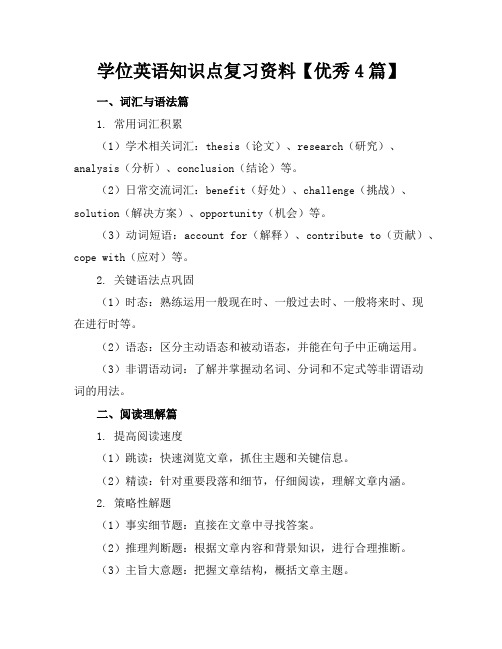
学位英语知识点复习资料【优秀4篇】一、词汇与语法篇1. 常用词汇积累(1)学术相关词汇:thesis(论文)、research(研究)、analysis(分析)、conclusion(结论)等。
(2)日常交流词汇:benefit(好处)、challenge(挑战)、solution(解决方案)、opportunity(机会)等。
(3)动词短语:account for(解释)、contribute to(贡献)、cope with(应对)等。
2. 关键语法点巩固(1)时态:熟练运用一般现在时、一般过去时、一般将来时、现在进行时等。
(2)语态:区分主动语态和被动语态,并能在句子中正确运用。
(3)非谓语动词:了解并掌握动名词、分词和不定式等非谓语动词的用法。
二、阅读理解篇1. 提高阅读速度(1)跳读:快速浏览文章,抓住主题和关键信息。
(2)精读:针对重要段落和细节,仔细阅读,理解文章内涵。
2. 策略性解题(1)事实细节题:直接在文章中寻找答案。
(2)推理判断题:根据文章内容和背景知识,进行合理推断。
(3)主旨大意题:把握文章结构,概括文章主题。
三、完形填空篇1. 培养语感2. 注意上下文联系在解题过程中,关注上下文之间的联系,尤其是代词、转折词等。
四、写作篇1. 提高写作能力(1)积累素材:多阅读优秀文章,学习写作技巧。
(2)模拟练习:针对不同题型,进行模拟练习。
2. 熟悉写作模板学位英语知识点复习资料【优秀4篇】三、听力理解篇1. 提升听力技巧(1)预测能力:在听前根据题目和选项预测对话或短文的内容。
(2)关键词定位:在听的过程中,关注关键词,如数字、专有名词等,以便抓住关键信息。
2. 培养日常听力习惯(1)多听英语广播、新闻、电影等,提高对不同口音和语速的适应能力。
四、翻译篇1. 掌握翻译技巧(1)直译与意译相结合:根据语境灵活运用直译和意译。
(2)词汇准确:确保翻译的词汇准确无误,符合原文含义。
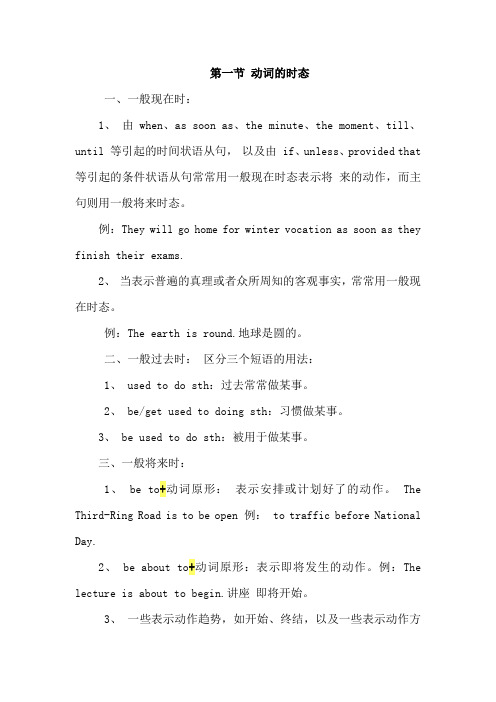
第一节动词的时态一、一般现在时:1、由 when、as soon as、the minute、the moment、till、until 等引起的时间状语从句,以及由 if、unless、provided that 等引起的条件状语从句常常用一般现在时态表示将来的动作,而主句则用一般将来时态。
例:They will go home for winter vocation as soon as they finish their exams.2、当表示普遍的真理或者众所周知的客观事实,常常用一般现在时态。
例:The earth is round.地球是圆的。
二、一般过去时:区分三个短语的用法:1、 used to do sth:过去常常做某事。
2、 be/get used to doing sth:习惯做某事。
3、 be used to do sth:被用于做某事。
三、一般将来时:1、 be to+动词原形:表示安排或计划好了的动作。
The Third-Ring Road is to be open 例: to traffic before National Day.2、 be about to+动词原形:表示即将发生的动作。
例:The lecture is about to begin.讲座即将开始。
3、一些表示动作趋势,如开始、终结,以及一些表示动作方向,如往来的动词,常常用现在进行时态表示按照安排将于将来发生的事情,这类动词常见的有如: start, go, leave, come, arrive 等。
例:We are leaving for Beijing tomorrow.我们明天动身去北京。
四、进行时态:重点区分 when 和 while 引起的时间状语的用法。
When 表示时间上的点,在考试中其引导的时间状语从句多翻译为“这时…” ,主句多用进行时态;while 引导的时间状语从句多翻译为“正当…时” ,该从句用进行时态。
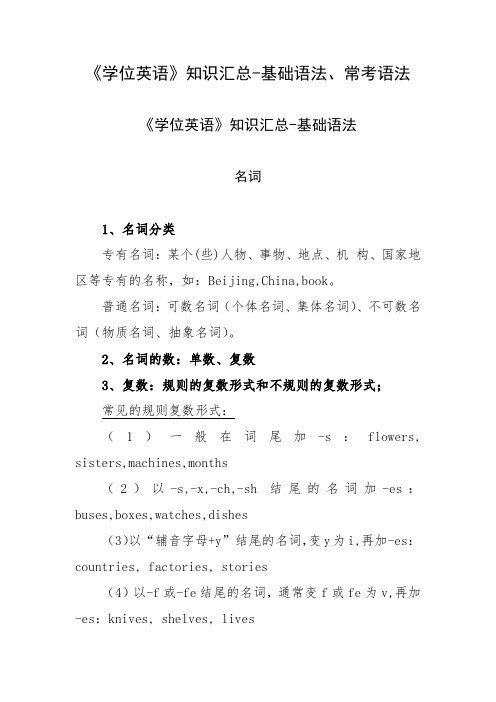
《学位英语》知识汇总-基础语法、常考语法《学位英语》知识汇总-基础语法名词1、名词分类专有名词:某个(些)人物、事物、地点、机构、国家地区等专有的名称,如:Beijing,China,book。
普通名词:可数名词(个体名词、集体名词)、不可数名词(物质名词、抽象名词)。
2、名词的数:单数、复数3、复数:规则的复数形式和不规则的复数形式;常见的规则复数形式:(1)一般在词尾加-s:flowers, sisters,machines,months(2)以-s,-x,-ch,-sh结尾的名词加-es:buses,boxes,watches,dishes(3)以“辅音字母+y”结尾的名词,变y为i,再加-es:countries, factories, stories(4)以-f或-fe结尾的名词,通常变f或fe为v,再加-es:knives, shelves, lives(5)以“辅音字母+o”结尾的名词加-es:tomatoes, potatoes, heroes常见的不规则复数形式:(1)改变单数名词内部元音使其变为复数。
例如:man—men woman—women foot—feet tooth—teeth(2)在单数名词词尾加-ren或-en。
例如:child——children ox—oxen(3)复数形式与单数形式相同。
例如:sheep—sheep deer—deer means—means(4)一些外来词仍保留其原来的名词复数形式。
例如:basis—bases thesis—theses analysis—analyses(5)表示“某国人”的名词的单、复数形式因习惯不同而各异。
①一般以-se或-ss结尾,单复数形式相同。
例如:Chinese, Japanese, Swiss, Portuguese等。
②词尾加-s,构成复数。
例如:German, American, Australian, Canadian, Italian, Belgian, Greek, Hungarian, Swede, Arab等。
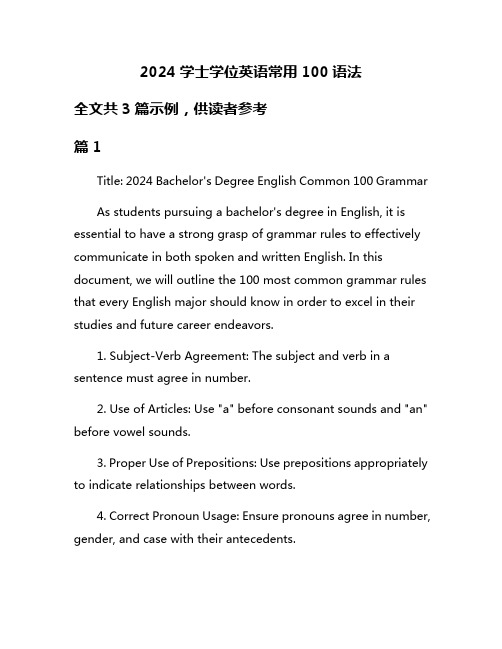
2024学士学位英语常用100语法全文共3篇示例,供读者参考篇1Title: 2024 Bachelor's Degree English Common 100 GrammarAs students pursuing a bachelor's degree in English, it is essential to have a strong grasp of grammar rules to effectively communicate in both spoken and written English. In this document, we will outline the 100 most common grammar rules that every English major should know in order to excel in their studies and future career endeavors.1. Subject-Verb Agreement: The subject and verb in a sentence must agree in number.2. Use of Articles: Use "a" before consonant sounds and "an" before vowel sounds.3. Proper Use of Prepositions: Use prepositions appropriately to indicate relationships between words.4. Correct Pronoun Usage: Ensure pronouns agree in number, gender, and case with their antecedents.5. Verb Tense Consistency: Maintain consistent verb tense throughout a sentence or paragraph.6. Avoiding Double Negatives: Avoid using two negative words in the same sentence.7. Parallel Structure: Use parallel structure when listing items or ideas in a series.8. Avoiding Run-On Sentences: Separate independent clauses with appropriate punctuation.9. Correct Use of Commas: Use commas to separate items ina list and after introductory phrases.10. Proper Use of Semicolons: Use semicolons to separate independent clauses in a compound sentence.11. Correct Capitalization: Capitalize proper nouns and the first word in a sentence.12. Avoiding Dangling Participles: Ensure participial phrases modify the intended noun.13. Use of Contractions: Use contractions in informal writing but avoid them in formal writing.14. Avoiding Split Infinitives: Keep the infinitive form of a verb intact by not placing adverbs between "to" and the verb.15. Proper Use of Quotation Marks: Use quotation marks to indicate direct speech or to enclose titles of shorter works.16. Correct Subject-Verb Agreement with Collective Nouns: Treat collective nouns as singular when they refer to a group acting as a whole.17. Use of Active Voice: Prefer using active voice for clearer and more concise writing.18. Correct Use of Relative Pronouns: Choose the appropriate relative pronoun (who, whom, whose, which, that) to connect clauses.19. Proper Use of Modal Verbs: Use modal verbs (can, could, may, might, shall, should, will, would, must) to indicate possibility, obligation, or permission.20. Avoiding Redundancy: Remove unnecessary words or phrases that do not add meaning to the sentence.21. Correct Use of Adjective Order: Adjectives should be placed in a specific order before a noun (opinion, size, age, shape, color, origin, material, purpose).22. Use of Comparatives and Superlatives: Use "-er" or "more" for comparatives and "-est" or "most" for superlatives.23. Correct Use of Gerunds and Infinitives: Use gerunds (-ing form) as subjects or objects of a sentence and infinitives (to + base form of the verb) as verbs after certain phrases.24. Proper Use of Articles with Countable and Uncountable Nouns: Use "a/an" with countable nouns and no article with uncountable nouns.25. Avoiding Misplaced Modifiers: Place modifiers close to the word they are meant to describe.26. Correct Use of Intensifiers: Use intensifiers (very, extremely, quite) to emphasize adjectives or adverbs.27. Distinguishing Between "Fewer" and "Less": Use "fewer" for countable nouns and "less" for uncountable nouns.28. Correct Use of Prepositional Phrases: Use prepositions before phrases to show relationships between words.29. Avoiding Comma Splices: Do not join independent clauses with commas without a coordinating conjunction.30. Use of Dash vs. Hyphen: Use a hyphen to join compound words and a dash to indicate a pause or interruption in a sentence.31. Correct Use of Indirect Speech: Change pronouns, tenses, and time expressions when reporting indirect speech.32. Avoiding Clichés: Use original language rather than relying on overused expressions.33. Proper Use of Ambiguous Pronouns: Clarify the antecedent of a pronoun to avoid ambiguity.34. Correct Use of Attributive vs. Predicative Adjectives: Use attributive adjectives before nouns and predicative adjectives after linking verbs.35. Use of Conditional Sentences: Use if-clauses to express hypothetical scenarios and their possible outcomes.36. Avoiding Passive Voice: Prefer active voice for more dynamic and engaging writing.37. Proper Use of Prepositional Phrases: Place prepositions before phrases to indicate time, place, or direction.38. Correct Use of Exclamation Marks: Use exclamation marks to convey strong emotions or exclamations.39. Avoiding Awkward Sentence Structures: Rearrange sentences to improve clarity and readability.40. Distinguishing Between "Its" and "It's": Use "its" as a possessive pronoun and "it's" as a contraction for "it is" or "it has."41. Use of Parentheses vs. Commas: Use commas for essential information and parentheses for nonessential information.42. Correct Use of Prepositional Phrases: Use prepositions before phrases to show relationships between words.43. Avoiding Repetitive Sentence Starters: Vary sentence beginnings to maintain reader interest.44. Proper Use of Hyphens with Prefixes: Use hyphens with prefixes to clarify meaning or avoid confusion.45. Correct Use of Conditional Clauses: Use conditional clauses to express conditions and their consequences.46. Use of Question Tags: Use question tags to confirm information or seek agreement.47. Avoiding Sentence Fragments: Ensure each sentence hasa subject and a verb to form a complete thought.48. Proper Use of Capitalization in Titles: Capitalize the first and last words in titles and all important words in between.49. Correct Use of Superlatives: Use superlatives to compare three or more items or people.50. Avoiding Clichés: Use original language and vivid descriptions to engage readers.51. Proper Use of Transitional Expressions: Use transitional words and phrases to connect ideas and improve flow.52. Correct Use of Pronouns after Than or As: Use objective pronouns (me, him, her, us, them) after "than" or "as."53. Use of Indefinite Pronouns: Use indefinite pronouns (anyone, nobody, somebody, everyone) as singular in agreement with verbs.54. Avoiding Misplaced Modifiers: Place modifiers close to the word they are meant to describe.55. Proper Use of Indirect Speech: Change pronouns, tenses, and time expressions when reporting indirect speech.56. Correct Use of Articles with Countable and Uncountable Nouns: Use "a/an" with countable nouns and no article with uncountable nouns.57. Use of Commas with Coordinating Conjunctions: Use commas before coordinating conjunctions (and, but, or) to separate independent clauses.58. Avoiding Ambiguous Pronouns: Clarify the antecedent ofa pronoun to avoid confusion.59. Proper Use of Gerunds and Infinitives: Use gerunds (-ing form) as subjects or objects of a sentence and infinitives (to + base form of the verb) as verbs after certain phrases.60. Correct Use of Modal Verbs: Use modal verbs (can, could, may, might, shall, should, will, would, must) to indicate possibility, obligation, or permission.61. Avoiding Run-On Sentences: Separate independent clauses with appropriate punctuation.62. Proper Use of Personal Pronouns: Use personal pronouns (I, you, he, she, it, we, they) to avoid repetition of nouns.63. Correct Subject-Verb Agreement with Collective Nouns: Treat collective nouns as singular when they refer to a group acting as a whole.64. Use of Adverb Placement: Place adverbs before the main verb or after an auxiliary verb.65. Avoiding Dangling Participles: Ensure participial phrases modify the intended noun.66. Proper Use of Indefinite Articles: Use "a" before consonant sounds and "an" before vowel sounds.67. Correct Use of Relative Pronouns: Choose the appropriate relative pronoun (who, whom, whose, which, that) to connect clauses.68. Use of Prepositions to Indicate Relationships: Use prepositions appropriately to show connections between words.69. Avoiding Sentence Fragments: Ensure each sentence hasa subject and a verb to form a complete thought.70. Proper Use of Comma Splices: Do not join independent clauses with commas without a coordinating conjunction.71. Correct Use of Irregular Verbs: Use irregular verbs in their correct past and past participle forms.72. Use of Parallel Structure: Use parallel structure when listing items or ideas in a series.73. Avoiding Double Negatives: Avoid using two negative words in the same sentence.74. Proper Use of Comparative Adjectives: Use comparative adjectives to compare two items or people.75. Correct Placement of Adverbs: Place adverbs before the main verb or after an auxiliary verb.76. Use of Intransitive Verbs: Use intransitive verbs that do not require an object to complete the meaning.77. Avoiding Split Infinitives: Keep the infinitive form of a verb intact by not placing adverbs between "to" and the verb.78. Proper Use of Coordinating Conjunctions: Use coordinating conjunctions (and, but, or, nor, for, so, yet) to join words, phrases, or clauses.79. Correct Use of Contractions: Use contractions in informal writing but avoid them in formal writing.80. Use of Interrogative Pronouns: Use interrogative pronouns (who, whom, whose, which, what) to ask questions.81. Avoiding Awkward Sentence Structures: Rearrange sentences to improve clarity and readability.82. Proper Use of Intensifiers: Use intensifiers (very, extremely, quite) to emphasize adjectives or adverbs.83. Correct Use of Exclamation Marks: Use exclamation marks to convey strong emotions or exclamations.84. Use of Attributive Adjectives: Place attributive adjectives before nouns to describe them.85. Avoiding Repetitive Sentence Starters: Vary sentence beginnings to maintain reader interest.86. Proper Use of Question Tags: Use question tags to confirm information or seek agreement.87. Correct Use of Attributive vs. Predicative Adjectives: Use attributive adjectives before nouns and predicative adjectives after linking verbs.88. Use of Conditional Clauses: Use if-clauses to express hypothetical scenarios and their possible outcomes.89. Avoiding Redundancy: Remove unnecessary words or phrases that do not add meaning to the sentence.90. Proper Use of Ambiguous Pronouns: Clarify the antecedent of a pronoun to avoid ambiguity.91. Correct Use of Modal Verbs: Use modal verbs (can, could, may, might, shall, should, will, would, must) to indicate possibility, obligation, or permission.92. Use of Gerunds and Infinitives: Use gerunds (-ing form) as subjects or objects of a sentence and infinitives (to + base form of the verb) as verbs after certain phrases.93. Avoiding Clichés: Use original language rather than relying on overused expressions.94. Proper Use of Hyphens with Prefixes: Use hyphens with prefixes to clarify meaning or avoid confusion.95. Correct Use of Indirect Speech: Change pronouns, tenses, and time expressions when reporting indirect speech.96. Use of Comparative Adjectives: Use comparative adjectives to compare two items or people.97. Avoiding Misplaced Modifiers: Place modifiers close to the word they are meant to describe.98. Proper Use of Relative Pronouns: Choose the appropriate relative pronoun (who, whom, whose, which, that) to connect clauses.99. Correct Use of Conditional Clauses: Use conditional clauses to express conditions and their consequences.100. Use of Question Tags: Use question tags to confirm information or seek agreement.In conclusion, mastering these 100 grammar rules will equip English majors with the necessary tools to communicate effectively and confidently in both academic and professional settings. By adhering to these guidelines, students can enhance their writing and speaking skills, ultimately leading to success in their studies and future careers.篇22024 Bachelor's Degree in English GrammarGrammar is an essential component of the English language, and having a strong grasp of grammar rules is crucial for effective communication. As a student pursuing a bachelor's degree in English, it is important to familiarize yourself with the key grammar concepts that are commonly used in the language. In this document, we will outline the top 100 grammar rules that you should be familiar with to excel in your studies and become a proficient English speaker.1. Subject-Verb Agreement: Make sure that the subject and verb in a sentence agree in number and person.2. Use of Articles: Use "a" before consonant sounds and "an" before vowel sounds.3. Tenses: Understand the various tenses in English, such as present, past, and future.4. Use of Prepositions: Use prepositions to show the relationship between objects in a sentence.5. Pronouns: Know how to use pronouns correctly in place of nouns.6. Adjectives vs. Adverbs: Understand the difference between adjectives, which describe nouns, and adverbs, which describe verbs.7. Sentence Structure: Be familiar with different sentence structures, such as simple, compound, and complex sentences.8. Punctuation: Know how to use commas, semicolons, colons, and other punctuation marks correctly.9. Parallelism: Make sure that parallel elements in a sentence have the same grammatical structure.10. Active vs. Passive Voice: Understand the difference between active and passive voice and know when to use each.These are just a few examples of the grammar rules that you will encounter in your studies. By mastering these rules and practicing them regularly, you will improve your English skillsand become a proficient speaker and writer. Good luck with your studies!篇32024 Bachelor's Degree in English Common 100 GrammarGrammar is an essential component of any language, including English. As students pursuing a Bachelor's degree in English, it is crucial to have a strong grasp of grammar rules to effectively communicate and write in the language. Below are 100 common grammar rules that you need to know as you work towards your Bachelor's degree in English.1. Use "a" before words that start with a consonant sound and "an" before words that start with a vowel sound.2. Use "the" when referring to a specific noun and omit it when referring to a general noun.3. Use "I" as the subject pronoun and "me" as the object pronoun.4. Use "who" for subjects and "whom" for objects in a sentence.5. Use "bring" for things coming towards you and "take" for things going away from you.6. Use "that" for restrictive clauses and "which" fornon-restrictive clauses.7. Use "who" for people and "that" for things.8. Use "it's" as a contraction of "it is" and "its" as a possessive pronoun.9. Use "your" as a possessive pronoun and "you're" as a contraction of "you are."10. Use "affect" as a verb and "effect" as a noun.11. Use "they're" as a contraction of "they are" and "their" asa possessive pronoun.12. Use "then" to show time and "than" for comparisons.13. Use "lose" when you are not winning and "loose" when something is not tight.14. Use "here" when referring to a specific location and "hear" when referring to listening.15. Use "it's" as a contraction of "it has" and "it is" in informal writing.16. Use "a lot" as two words, not one.17. Use "fewer" for countable objects and "less" for uncountable objects.18. Use "farther" for physical distance and "further" for metaphorical distance.19. Use "lay" when placing something down and "lie" when resting.20. Use the correct form of "to be" (am, is, are) with the present participle ("-ing") and "have" with the past participle ("-ed").21. Use "which" for non-defining relative clauses and "that" for defining relative clauses.22. Use "amount" for uncountable nouns and "number" for countable nouns.23. Use "as" to compare actions and "like" to compare nouns.24. Use "whose" to show possession.25. Use "may" for permission and "might" for possibility.26. Use "must" for obligation and "should" for advice.27. Use "will" for future predictions.28. Use "can" for ability.29. Use "could" for past ability or possibility.30. Use "would" for hypothetical situations.31. Use "wish" + past simple for regrets about the present and "wish" + past perfect for regrets about the past.32. Use "even though" and "although" to show contrast.33. Use "whether" for two options and "if" for one option.34. Use "unless" to show exceptions.35. Use "so that" to show purpose.36. Use "in order to" to show purpose.37. Use "although" to show concession.38. Use "while" to show contrast.39. Use "after" + gerund for actions that happen at the same time and "after" + present simple for actions that happen one after another.40. Use "before" + gerund for actions that happen at the same time and "before" + present simple for actions that happen one after another.41. Use "during" to show duration.42. Use "because of" for reasons.43. Use "due to" before a noun phrase and "because of" before a clause.44. Use "so that" to show purpose.45. Use "as long as" for condition.46. Use "since" for time and "for" for duration.47. Use "until" + simple present for future actions.48. Use "when" for actions that happen at the same time.49. Use "while" for actions that happen one after another.50. Use "as" to show two actions that happen at the same time.51. Use "so that" to show purpose.52. Use "as long as" for condition.53. Use "although" to show concession.54. Use "even though" to show contrast.55. Use "while" to show two actions that happen at the same time.56. Use "however" for contrasts.57. Use "otherwise" for consequences.58. Use "consequently" for results.59. Use "on the other hand" for contrasts.60. Use "meanwhile" to show actions happening at the same time.61. Use "image" when talking about something visual and "imagination" when talking about something in your mind.62. Use "famous" when talking about someone or something widely known and "notorious" when talking about someone or something widely known for a negative reason.63. Use "raise" for bringing something up and "rise" for going up.64. Use "rein" to control and "reign" to rule.65. Use "passed" as the past tense of "pass" and "past" to refer to something that has already happened.66. Use "emigrate" when leaving a country and "immigrate" when entering a country.67. Use "every day" to mean each day and "everyday" to mean ordinary.68. Use "good" as an adjective and "well" as an adverb.69. Use "further" to mean additional and "farther" to refer to physical distance.70. Use "former" to refer to the first of two things and "latter" to refer to the second of two things.71. Use "complement" to complete or enhance something and "compliment" to praise or admire.72. Use "accept" to receive and "except" to exclude.73. Use "advice" as a noun and "advise" as a verb.74. Use "affect" as a verb and "effect" as a noun.75. Use "principal" to refer to the head of a school or an important person and "principle" to refer to a fundamental truth or rule.76. Use "than" in comparisons and "then" to indicate time or sequence.77. Use "less" with uncountable nouns and "fewer" with countable nouns.78. Use "aloud" to describe something spoken out loud and "allowed" to reference permission or authorization.79. Use "already" to show that something has happened before now and "all ready" to mean completely prepared.80. Use "allude" to suggest or indirectly mention something and "elude" to escape or avoid.81. Use "all together" to mean everyone or everything in a group and "altogether" to mean completely or entirely.82. Use "any more" to mean an additional quantity and "anymore" to mean any longer or any further.83. Use "bring" to carry something or someone to a place and "take" to carry something or someone from a place.84. Use "capital" to refer to the city where a government is located or funds for investment and "capitol" to refer to the building where a legislative body meets.85. Use "cite" to give credit to a source or reference a precedent and "site" to refer to a place or location.86. Use "accept" to receive something and "except" to exclude something.87. Use "advice" as a noun and "advise" as a verb.88. Use "affect" as a verb that means to influence and "effect" as a noun that means result.89. Use "allusion" to make an indirect reference and "illusion" to refer to a false perception.90. Use "altar" to refer to a platform used in religious practices and "alter" to mean to change.91. Use "creek" to refer to a small stream or waterway and "creak" to refer to a high-pitched sound.92. Use "complement" to enhance or complete and "compliment" to praise or commend.93. Use "elicit" to draw out a reaction or information and "illicit" to refer to something that is illegal or forbidden.94. Use "emigrate" to leave one country for another and "immigrate" to enter a country to live.95. Use "farther" to refer to physical distance and "further" to mean additional or more advanced.96. Use "flaunt" to show off or display something prominently and "flout" to disregard or defy a rule or law.97. Use "its" as a possessive pronoun and "it's" as a contraction of "it is."98. Use "later" to refer to a time following another event and "latter" to refer to the second of two items.99. Use "loose" to refer to something not securely fixed in place and "lose" to cease to have possession of something.100. Use "principal" to refer to a person in a position of authority or importance and "principle" to refer to a fundamental truth or law.By mastering these common grammar rules, you will improve your English language skills and become a more effective communicator. As you work towards your Bachelor's degree in English, remember to practice these rules in your writing and speaking to enhance your language proficiency. Good luck on your academic journey!。
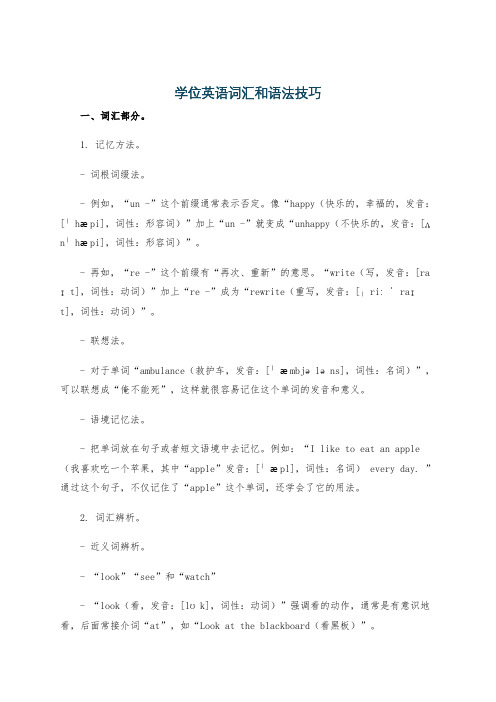
学位英语词汇和语法技巧一、词汇部分。
1. 记忆方法。
- 词根词缀法。
- 例如,“un -”这个前缀通常表示否定。
像“happy(快乐的,幸福的,发音:[ˈhæpi],词性:形容词)”加上“un -”就变成“unhappy(不快乐的,发音:[ʌnˈhæpi],词性:形容词)”。
- 再如,“re -”这个前缀有“再次、重新”的意思。
“write(写,发音:[ra ɪt],词性:动词)”加上“re -”成为“rewrite(重写,发音:[ˌriːˈraɪt],词性:动词)”。
- 联想法。
- 对于单词“ambulance(救护车,发音:[ˈæmbjələns],词性:名词)”,可以联想成“俺不能死”,这样就很容易记住这个单词的发音和意义。
- 语境记忆法。
- 把单词放在句子或者短文语境中去记忆。
例如:“I like to eat an apple (我喜欢吃一个苹果,其中“apple”发音:[ˈæpl],词性:名词) every day. ”通过这个句子,不仅记住了“apple”这个单词,还学会了它的用法。
2. 词汇辨析。
- 近义词辨析。
- “look”“see”和“watch”- “look(看,发音:[lʊk],词性:动词)”强调看的动作,通常是有意识地看,后面常接介词“at”,如“Look at the blackboard(看黑板)”。
- “see(看见,发音:[siː],词性:动词)”强调看的结果,例如“I can see a bird in the tree(我能看见树上有一只鸟)”。
- “watch(观看,注视,发音:[wɒtʃ],词性:动词)”通常指观看动态的事物,如“watch TV(看电视)”或者“watch a football game(观看一场足球比赛)”。
- 形近词辨析。
- “quite(很,非常,发音:[kwaɪt],词性:副词)”和“quiet(安静的,发音:[ˈkwaɪət],词性:形容词)”。
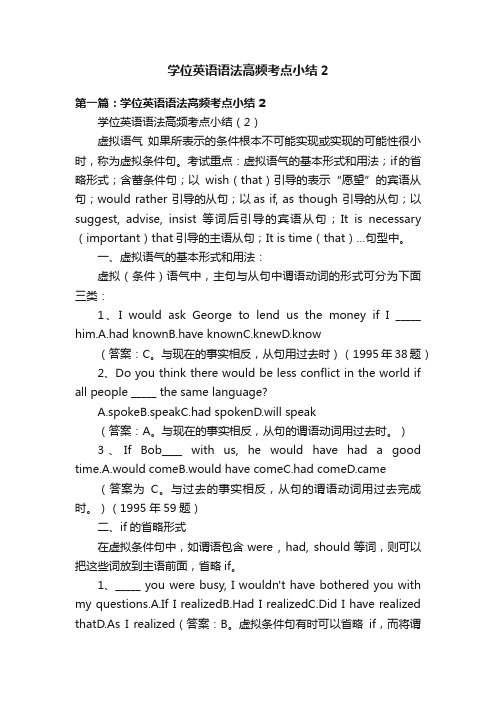
学位英语语法高频考点小结2第一篇:学位英语语法高频考点小结 2学位英语语法高频考点小结(2)虚拟语气如果所表示的条件根本不可能实现或实现的可能性很小时,称为虚拟条件句。
考试重点:虚拟语气的基本形式和用法;if的省略形式;含蓄条件句;以wish(that)引导的表示“愿望”的宾语从句;would rather 引导的从句;以as if, as though 引导的从句;以suggest, advise, insist 等词后引导的宾语从句;It is necessary (important)that引导的主语从句;It is time(that)…句型中。
一、虚拟语气的基本形式和用法:虚拟(条件)语气中,主句与从句中谓语动词的形式可分为下面三类:1、I would ask George to lend us the money if I _____ him.A.had knownB.have knownC.knewD.know(答案:C。
与现在的事实相反,从句用过去时)(1995年38题)2、Do you think there would be less conflict in the world if all people _____ the same language?A.spokeB.speakC.had spokenD.will speak(答案:A。
与现在的事实相反,从句的谓语动词用过去时。
)3、If Bob____ with us, he would have had a good time.A.would comeB.would have comeC.had comeD.came (答案为C。
与过去的事实相反,从句的谓语动词用过去完成时。
)(1995年59题)二、if的省略形式在虚拟条件句中,如谓语包含were , had, should等词,则可以把这些词放到主语前面,省略if。

学位英语考试复习语法学位英语考试复习语法1.一般现在时可以代替将来时,用于时间和条件状语从句中。
例如:1)Return the book immediately to the library as soon as you __A___ it.A. finishB. are finishedC. have finishedD. are finishing2)Please be sure to telephone me the next time you _D____.A. will comeB. would comeC. shall comeD. come2.在“This is the first time…”结构中,后面的从句用现在完成时。
句子开头也可以用it代替this例:This is the first time that I have met Jane.3.在“It/This is +形容词最高级+名词后面的从句中,用现在完成时。
”例:This is one of the best books _A____ on the subject.A. that have ever been writtenB. which have ever been writtenC. that has ever been writtenD. whatever have been written4.在“It is/has been+时间段+since…后边用过去时。
”例:It has been twenty years since I left my hometown.5.在“no sooner…than”和“hardly… when…”结构中,主句部分用过去完成时,从句部分用过去时。
例如:1)I had no sooner returned than he called.2)We had hardly begun when we were told to stop.6.在“It is (high) time后边的从句中用过去时。

学位英语语法基础知识:句法分析1、主语:是句子要说明的人或物,可以作主语的成分有名词,主语一般在句首。
注意名词单数形式常和冠词不分家!1)Mr. Lee is a well-known scientist. 名词作主语2)He reads newspapers everyday. 代词作主语3)Two and ten is twelve. 数词作主语4)Smoking is harmful to the health. 动名词作主语5)To swim in that pool is a great pleasure. 动词不定式作主语6)What we shall do next is not yet decided. 从句作主语2、谓语:说明主语的动作,状态或特征1)The new term begins on the 1st of September.2)His father is an engineer.3)She seemed happy.4)Li Hua showed me his album.3、宾语:指的是及物动词涉及到的人或物1)Wang Ling lent me a novel to read in the bus.2)The medicine is good for a cold.3)How many pieces do you want?4)My little sister always likes to ask questions.5)Would you mind coming earlier tomorrow?6)He asked me what I was going to do tonight4、宾语补足语:在宾语后面补充说明宾语的动作、状态、特征。
1)The government appointed(任命)her chief delegate (首席代表)to the conference.2)I don‘t believe the story true.3)You should put your things in order(有序).4)The doctor advised her to stay in bed for a week.5)We saw the pupils playing basketball.5、表语:位于系动词如be之后,说明主语身份,特征,属性或状态。